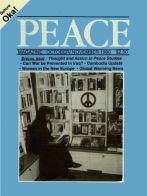
Peace Magazine Oct-Nov 1990, page 6. Some rights reserved.
Search for other articles by Barry Wellman here
" THE LADA is fast, but the Skoda is quick!" my cornpanion exulted, as she squirted past on the inside of a curve. She smiled. "He will feel humiliated."Shehadstruek another blow against machismo on tile road to Gabrovo.
We'd been following the Lada for 10 kilometers in standard Bulgarian fashion, tailgating nose to bumper. Every time we had swung out to pass, the Lada had pulled away. Hence the inside pass. "There was nothing else to do."
To celebrate our triumphal pass, we ate salami and an apple, as well as granola I'd imported from Toronto's Harbord Bakery. All Bulgarians travel with bags of food and a 5-liter gas can, to be used when no gas stations are open or line-ups are more than a half-hour. The last resort is the 2-liter can buried in the trunk. This has become a Bulgarian metaphor: "To use my last two liters" means to dig down within oneself for the last bit of emergency energy.
The approved queuing procedure is to shut off the engine why bum the gas you are waiting for? Two people cooperate: one pushing, the other steering. Fortunately, socialist cars are light.
I asked about Trabants, the noisy little car from East Germany. Someonejoked that Bulgarian farmers hated them. "The sheep eat right through them."
Of course, I had to drive the lively Skoda. The speed limit was 80 kph, so like all Bulgarians (except Trabant drivers) I did more than 100. A vibration at 100 suggested I take itup to 120. No need for concern, a cooperative radar detection system was at work. Bulgarian radar traps are stationary on a parked police car or pointed (like a bazooka) by a policeman standing by the road. When drivers pass such a trap, they flash their headlights at oncoming traffic for the next five kilometers. Everyone smiles, waves, and slows down in tflie socialist cooperation.
This system is cheaper than an electronic radar detector but not as reliable. As I came over a hill, a man ran into the middle of the road waving a little red octagonal sign with "Stop" written on it in English. I realized that we hadn't been passed in the opposite direction for over five kilometers.
The uniforrmed policeman had a huge handlebar moustache. Another man was in civilian clothes with a red arm band, a party volunteer doing his bit for good driving morality.
The two policemen demanded my license. My companion began talking fast. Her voice and body language became deferential you do not deal with the police as you do with macho Lada drivers. The policemen were perplexed. They could handle two categories of speeders: Bulgarians, and foreigners in foreign cars. I was the anomaly-a foreigner driving a Bulgarian car.
A solution came after long discussion and several Marlboros shared "for friendship." My visit to the conference in Bulgaria had been sponsored by the Trade Union Confederation, now headed by a sociologist. The policemen decided that I was a prosperous trade unionist come to invest in the "new Bulgaria." My punishment: My companion was ordered to give me a stern lecture in English on proper Bulgarian driving.
BULGARIA was awaiting the first free election of many years. CFhe Communist Party had taken over in 1944, and there had been an authoritarian monarchy before.) The Todor Zhivkov regime had been ousted October 10, 1989by an intra-party coup. The Berlin Wall had toppled simultaneously, so Bulgaria had received only a few paragraphs.
Although the regime had fallen, the party continued in power, changing its name to the more photogenic "Bulgarian Socialist Party," which ran on the decidedly post-revolutionary platform of "Tradition and Authority."
The Socialist (nie Communist) Party won the June election with a small majority. They carried the rural areas strongly but lost in the capital city, Sofia. They got the type of vote that normally goes to conservatives in the West: rural, pensioners, older people, less-educated folks, those with perks, ethnic Bulgarians living in areas with a Turkish majority. The United Democratic Front got the urban vote, people repressed by the party, students, and those who have been waiting a long time for cars or flats.
The Socialist Party benefited by its monopoly status. It controlled all government ministries, virtually all commerce, farming and industry, and all local government. Although there had been similar situations elsewhere in Eastern Europe, only in Bulgaria were the Socialists/Communists able to wina quasi-free election.
The Socialist president was soon forced to resign-a victim of an embarrassing remark recorded on a VCR last December. The head of the opposition, a sociologist, is the new President. However, the Socialist party continues to run the cabinet. The situation is fluid at the end of September.
Barry Weliman is a sociology professor at University of Toronto. He published some portions o fthis paper in the Toronto Star.

Peace Magazine Oct-Nov 1990, page 6. Some rights reserved.
Search for other articles by Barry Wellman here